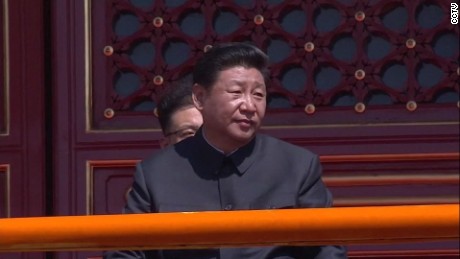By James Griffiths, CNN
Updated 1019 GMT (1819 HKT) February 26, 2018
Story highlights
- Dropping term limits will allow Xi Jinping to stay on as China's President indefinitely
- But analysts warn his absolute control could backfire in the instance of a crisis or economic shock
Hong Kong (CNN)The announcement Sunday that China will drop term limits on the presidency clears the way for Xi Jinping to rule the country indefinitely.
However, analysts warned that what initially seems like a demonstration of absolute power could actually be a sign of weakness, with Xi apparently unwilling to allow the rise of a potential political rival.
This could lead to future instability in the world's most populous country as wannabe successors jockey for power within a Communist Party (CCP) completely dominated by the 64-year-old Xi.
And his absolute authority will also leave him vulnerable to absolute blame in the instance of an economic shock or foreign policy crisis.
The latter could be increasingly likely, as Xi's rule so far has been characterized by a more bullish military and diplomatic policy as China seeks to move into a power vacuum left in Asia by a retreating Washington.
Xi Jinping's rise to power (2017) 01:53
Factional politics
Following Mao Zedong's death in 1976– in the wake of the Cultural Revolution, during which tens of thousands of people were killed and the country was racked by civil war — his successors moved away from one-man rule towards a consensus system where power was shared by a handful of high-ranking Party officials.
This resulted in relatively straightforward transition of power from Presidents Jiang Zemin to Hu Jintao to Xi Jinping, after each served two five-year terms in office.
Early in Xi's first term however, it became apparent he would seek to buck this trend. He was declared "core leader" of the Party, and state media began building up his public image with the type of hagiography not seen since Mao.
This culminated with "Xi Jinping Thought" being added to the Party constitution last year, at a key meeting in which Xi failed to nominate an obvious successor, fueling speculation he would stay on as leader past 2023.
Margaret Lewis, a law professor and expert on China's constitution at Seton Hall University, said under Xi "what we've seen is an increasing lack of sharing of power even among the top leadership."
"Xi's modus operandi is consolidation of power," she said.
That could pose a problem to him in the long run. While Chinese politics is not remotely democratic in the traditional sense, there are certain checks and balances within the Party system itself, with reformers and conservatives seeing their power and influence waxing and waning over time.
Jon Sullivan, director of the China Policy Institute at the University of Nottingham, said Xi remaining as President and head of state, "negates the institutionalization of power transitions that have served the Party well for 35 years, enabling it to avoid damaging schisms that have plagued other Communist regimes."
While many internal CCP matters happen in a black box, most experts agree that there are factions within the party — such as the so-called "Shanghai clique" around former President Jiang Zemin. Some have argued Xi's far-reaching anti-graft campaign is itself a tool to go after factional enemies and potential rivals.
That anti-corruption campaign will also get a boost with upcoming constitutional changes due to create a National Supervision Commission (NSC) with sweeping new enforcement powers, potentially affecting a much greater swath of China's population.
Message to enemies
Richard McGregor, author of "The Party: The Secret World of China's Communist Rulers," wroteafter Sunday's announcement that it "sends a warning to his legion of enemies at the top of the party who have been hit by the anti-corruption campaign: he is not going anywhere."
"Xi's ability to push this decision through in the short-term is undoubtedly a display of his grip on all levers of power," McGregor wrote. "But the very fact that he feels the need to do so could easily be a sign of something else — that he is possessed by an urgency to gather even more power than he already has to keep his enemies at bay."
This could result in increased pushback from within the Party, as those who had hoped to weather the Xi storm now have no option but to fight against him out of self-preservation.
According to Sullivan, term limits not only restrict the power of individual leaders, they give other elites and factions the consolation that there would be an opportunity to change the status quo after two terms.
"That 'consolation' is an important pressure valve that prevents crippling inner party battles. By getting rid of it, Xi is banking on being able to contain and neutralize his opponents," said Sullivan.
But doing so, Sullivan added, "will necessitate greater levels of repression, both in society and within the Party-state."


